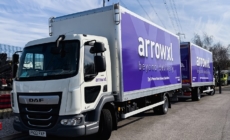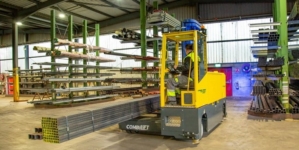-
ROSSLARE EUROPORT TARGETS HEALTH & SAFETY WITH CAMERA TELEMATICS PARTNERSHIP - 2 days ago
-
Landmark Study Reveals Wearable Robotics Significantly Boost Safety and Efficiency in Industrial Environments - July 24, 2024
-
Visku Tackle The Retail Seasonality Challenge One Pallet At A Time - July 22, 2024
-
KAMMAC AND BERGEN LOGISTICS STRENGTHEN FASHION & LIFESTYLE SERVICES IN THE UK - July 19, 2024
-
TENTBOX EXTENDS PARTNERSHIP WITH ARROWXL TO SUPPORT INCREASING DEMAND - July 17, 2024
-
The Perfume Shop improves customer journeys while driving profitability in partnership with Scurri - July 17, 2024
-
ZEROMISSION SECURES £2.3M ($3M) INVESTMENT TO ACCELERATE ELECTRIC FLEETS - July 16, 2024
-
BCMPA CELEBRATES SUCCESS OF 2024 CONFERENCE - July 15, 2024
-
Best of the Best: Jungheinrich Celebrates Triple International Award Win - July 12, 2024
-
GOPLASTICPALLETS.COM CALLS ON NEW CHANCELLOR RACHEL REEVES TO CONSIDER PLASTIC PACKAGING TAX REFORM - July 10, 2024
How To Create a Bespoke Logistics Plan for Your Business
Whether you are a start-up or operate a multi-national business, a bespoke logistics plan is vital in giving you the biggest opportunities for success.
It is hugely important to create an efficient distribution network, to ensure you consistently provide excellent customer service as well as minimising your operational costs. You will need to look at a variety of factors in order to do this, and it may need assessing on a regular basis.
Your Distribution Centres
You will firstly need to assess your distribution centres. Start with your base and assess whether the location is sustainable. Can you navigate to and from your consumers easily and efficiently? Do you have enough warehouse space for your goods?
If you are planning to grow the business, you may want to invest in additional warehouses in other areas for quicker and easier distribution.
If so, are the locations of each facility efficient for transportation flow? Are they easy to get in and out of? If your distribution centres are difficult to navigate to, it will lead to longer timescales for completing journeys, resulting in higher staff and fuel costs.
Your Products and Services
Then, think about any products your company distributes. Where do they come from? Where are they going to? Make sure you factor in any rules on importing and exporting goods. If, for example, there are large costs associated, or it will take longer for your goods to pass through border controls, this will need addressing in your business plan.
Also, depending on your business, you may need to employ a more specialist delivery company such as Tuffnells. They work with businesses, offering bespoke delivery options across the globe. So, no matter how big, small, heavy or light your load is, they can meet your requirements.
Your Suppliers
You also need to thoroughly research any suppliers you may rely on to carry out your business operations. The key things to look at are:
- Price – compare the prices offered by various suppliers to ensure you are using the most cost effective. Don’t always be tempted to go for the cheapest option, as you want to ensure they also offer quality and reliability.
- Location – where are they located? Bear in mind that the further away they are, the more it will cost to transport to your distribution centre(s).
- Range – does your business offer multiple products? If so, can you source all of these from one supplier to save having to deal with multiple parties?
- Size – will the supplier have the capacity and resources to provide the amount of product you require on a regular basis?
Every business is different, so it’s important to consider your individual needs and requirements. This will enable you to create a logistics plan that is right for your business, avoiding any hiccups further down the line.

































